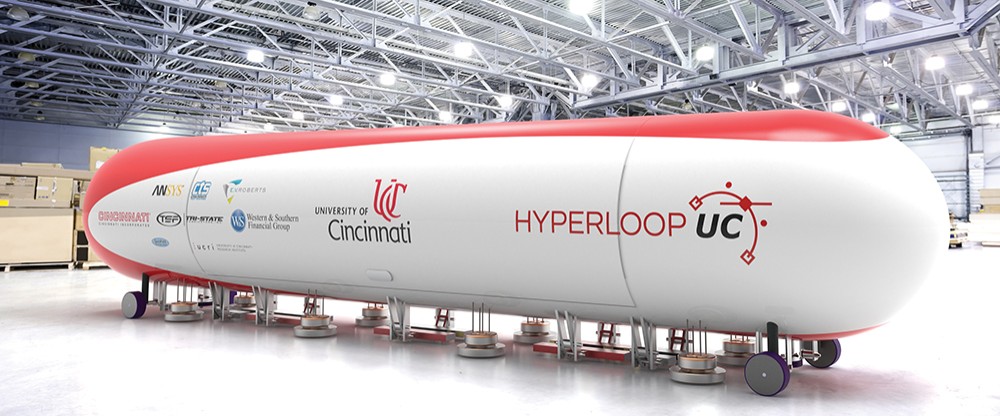
UC professor receives award from Crown Prince of Dubai
Aerospace professor wants Hyperloop UC to lead the international push for hyperloop technology in the Ohio region
Hyperloop UC, the University of Cincinnati research team, won the Innovative Project Team Award in the first cycle of the annual Hamdan Bin Mohammed Award for Innovation in Project Management. Team leader Shabaan Abdallah, PhD, accepted the award on behalf of Hyperloop UC at a ceremony in Dubai in November 2017. UC was one of 22 winners out of 1200 participants from top universities and institutes across the world.
Established under the patronage of H.H. Sheikh Hamdan bin Mohammed bin Rashid Al Maktoum, Crown Prince of Dubai and Chairman of the Dubai Executive Council, the award program aims to become “an international hub for innovators, professionals & corporations” to recognize best practices and excellence in project execution.
Abdallah, a professor of aerospace engineering, said of the award, “This is such a great honor for the University of Cincinnati.” Abdallah hopes to cultivate this mutual interest between the United States and other hyperloop projects worldwide, and to build partnerships that facilitate ongoing intellectual exchange.
The hyperloop is a proposed mode of transportation conceptualized by entrepreneur Elon Musk (CEO of SpaceX & Tesla Motors). It is a high-speed ground transportation system in which pressurized pods travel inside a low-pressure environment. The pods hover above an I-beam rail, using magnetic levitation or air casters to run at speeds over 750 MPH.
UC’s work on hyperloop technology has garnered global attention for its performance at the first SpaceX Hyperloop design competition in 2016. It was the first team to successfully make a pod hover 2 millimeters above the track (the minimum amount for safe movement).
Hyperloop UC submitted designs in all three SpaceX Hyperloop Competitions. The first year, the UC team placed among the top 30 chosen to compete in the finals (of 120 semi-finalists). During the second competition, Hyperloop UC was invited as an exhibition team and the representatives from the team attended the competition in the Summer of 2017.
Every year, members of the Hyperloop UC team reassesses its design to move towards a model that is efficient, scalable, cost-effective and safe. The project has attracted 60 students of all levels from across campus so far, including the College of Engineering and Applied Science, Design, Art, Architecture and Planning; UC Medicine; Lindner College of Business and the College of Arts and Sciences. Ten of Abdallah’s students have jobs with Tesla following the success of Hyperloop UC, and several others hold positions at local engineering and technology companies.
The race for the first hyperloop continues to grow on the international stage. The Dubai Roads and Transport Authority (RTA) and Virgin Hyperloop One unveiled an initial design of the Dubai Hyperloop Pod in February as Part of United Arab Emirates Innovation Month. The Saudi Arabian government is also investing in hyperloop. Saudi Crown Prince Mohammed bin Salman unveiled its Vision 2030 hyperloop pod for their own project this month, also in conjunction with Virgin Hyperloop One. The Saudi Prince’s Foundation, MiSK, and Virgin Hyperloop One also announced the creation of an internship program for Saudi engineering students in the US last February.
Abdallah hopes that global interest will drive the project to becoming a reality, and is working with community leaders to encourage investment in the disruptive technology on the local scale, as well.
Abdallah was approached by the Ohio-Kentucky-Indiana Regional Council of Governments (OKI) and Ohio Department of Transportation about applying his research in what they hope will be the next transportation revolution for the Midwest. Abdallah was invited to serve on a panel at an OKI plenary meeting in August to discuss the future of hyperloop in Ohio. He wants to see Cincinnati and UC join existing hyperloop movements in Columbus and Cleveland.
Abdallah is also developing a proposal to create an advanced transportation center for the tri-state area to support hyperloop and other initiatives. 32 UC faculty have already expressed interest in the interdisciplinary proposal. Abdallah is also awaiting news on a $2.6 million National Science Foundation grant proposal to build two hyperloop tubes, one at Covington airport and one on UC east campus. He has secured commitment from CVG and Warren County, should the proposal be accepted.
Abdallah and other researchers envision a wide range of applications for hyperloop technology, and not just in transportation; it has potential to revolutionize operations for the distribution industry and could even reduce barriers healthcare, by speeding transport of medical professionals and resources to underserved locations.
The Hamdan Bin Mohammed Award for Innovation in Project Management award committee strongly encourages any interested UC affiliates to apply for the next cycle of awards. For more information about the future of hyperloop at UC, visit the project’s website or contact Shaaban Abdallah.
Featured image at top: a HyperloopUC prototype is on display. Photo/UC Creative Services.
Next Lives Here
The University of Cincinnati is classified as a Research 1 institution by the Carnegie Commission and is ranked in the National Science Foundation's Top-35 public research universities. UC's students, alumni and faculty investigate problems and innovate solutions with real-world impact. Next Lives Here.
Related Stories
Leveling up
May 2, 2025
Meet four College of Allied Health Sciences students who are advancing their education following graduation this May.
UC engineering students recognized for achievement in...
May 1, 2025
Sixteen UC engineering students were honored for outstanding achievement in cooperative education at the close of the 2024-2025 school year.
Everything you need to know about scents and your hair
May 1, 2025
The University of Cincinnati's Kelly Dobos was featured in an NBC News article discussing the science behind hair fragrances and shampoos.
